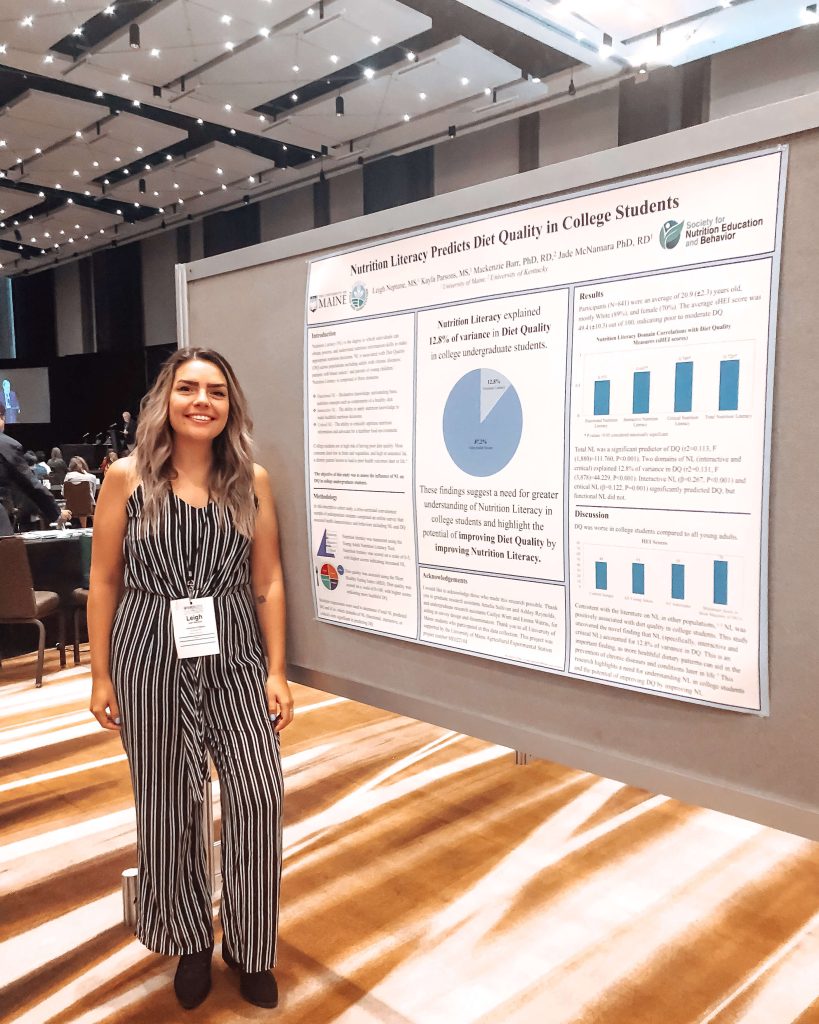
PhD Student at UMaine
Spotlight on Food & Nutrition Research – Featuring UMaine Graduate Students
GLOW (Guiding Lifemakers on Wellness) – Leigh Neptune, PhD Student at UMaine
What is the topic of your research, and why did you choose to pursue this area?
My research project is called GLOW (Guiding Lifemakers on Wellness). The goal of this research is to develop and pilot a web-based intervention to help support the physical and mental health of rural, low-income, pregnant and postpartum individuals living in Maine. Throughout 2022, our team worked together to create an online resource that will cater to the unique needs of our target population, and we plan to pilot the program later this year.
I chose this area of study because maternal and reproductive health have always been areas of interest to me. While I’m not yet a parent myself, so many people in my life are new parents and I have seen a glimpse of how difficult this transition can be. My greatest hope is to create something that will help people live healthier, more fulfilling lives, while also working toward my own professional goals, and I feel I’ve been able to do that with this research.
Would you give a brief summary of your research, including some background information, methods and major findings?
To create GLOW, we partnered with a team of health experts, including our invaluable contact at the local Special Supplemental Nutrition Program for Women, Infants, and Children (WIC) office, as well as pregnant and postpartum people who are currently using WIC resources. This method of including a team of community and research professionals in the development of a program is called Community-Based Participatory Research (CBPR). Using a CBPR approach has helped us to ensure that we are creating a resource that will truly address the needs of the people who use the program.
While we have yet to run the pilot program, we have conducted a qualitative study surrounding the experiences of our community advisory board (CAB) members during the process of developing GLOW. Participants highlighted several benefits of participating in this process including being able to collaborate with a diverse group to achieve a common goal, learning about perinatal health and/or the research process, and feeling a strong sense of community and support. CAB members felt that using CBPR was an innovative way to create relevant resources, beyond what could have been achieved with a research team alone. Finally, all participants interviewed expressed a strong belief that the program will be relevant, reliable, and effective at supporting the physical and mental health of the people who use it.

What are some limitations and implications for your research?
Limitations of this study include that our sample will be quite small and may not be generalizable to all perinatal individuals given the constraints of geographic location. Similarly, including more diverse perspectives during the creation of the program would have contributed to greater generalizability. Additionally, given the virtual nature of the program, I anticipate that some data may also be more difficult to collect which could result in further limitations.
The results from the CAB interviews suggest that CBPR is an effective way to create relevant and reliable health interventions in this population. These qualitative findings also indicate that the experience resulted in numerous benefits to all members of the CAB. My hope is that the results from the pilot program will further support this methodology, and that we will see notable positive changes in physical and mental health for the people who use our program.
Based on your findings and a review of the current literature, what advice or recommendations would you give to the general public?
Based on my findings so far, I would strongly suggest incorporating perspectives from a variety of stakeholders as much as possible when creating community health interventions. Including the opinions of the people who will actually be using your program is truly invaluable. I would also advise the general public to consider the care that is being provided to perinatal individuals in our country, and to take action in ways that are feasible to help support these individuals. Whether it be advocacy, voting for elected officials who will support adequate public health policies, or simply supporting perinatal individuals in your own life, supporting pregnant and postpartum people during the transition into parenthood will help to create a more physically and mentally healthy population of parents and children.
Have you submitted your research for publication (if so, what journal?), or are you in the process of writing an article for publication?
I submitted an abstract presenting the qualitative results from the CAB interviews to the International Society for Behavioral Nutrition and Physical Activity annual conference, at which I presented a brief oral presentation in Uppsala, Sweden in June of this year. I am currently working on this manuscript for publication. I will write an additional manuscript in the coming year that will encapsulate the methodology and results of the pilot program.
Leigh recently graduated from the combined Master’s and Dietetic Internship Program at the University of Maine in December 2021. She currently holds a bachelor’s and master’s degree in Food Science & Human Nutrition and is a licensed and registered dietitian nutritionist. She plans to graduate with her PhD in Food and Nutrition Sciences at the University of Maine in December 2024. Congratulations, Leigh!
